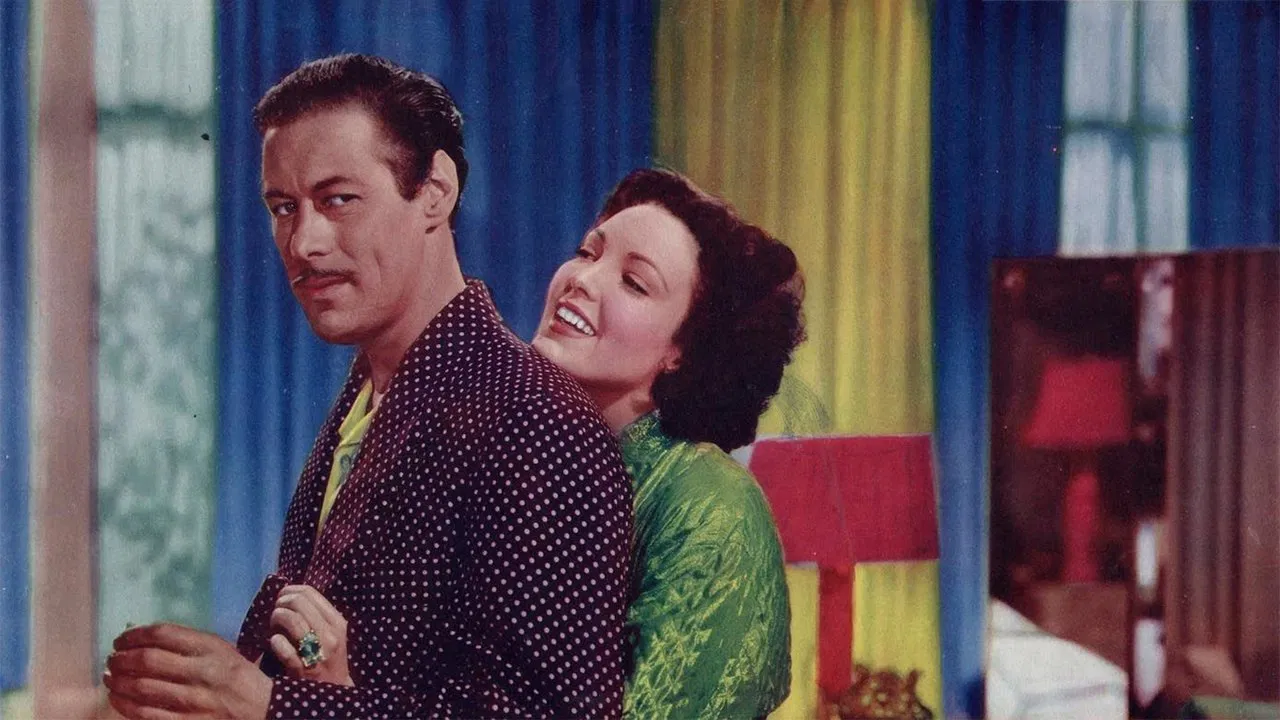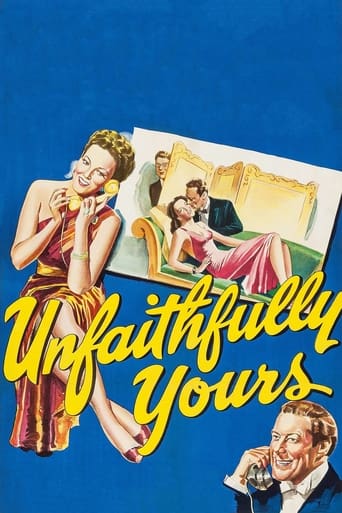Matcollis
This Movie Can Only Be Described With One Word.
UnowPriceless
hyped garbage
Kaydan Christian
A terrific literary drama and character piece that shows how the process of creating art can be seen differently by those doing it and those looking at it from the outside.
Juana
what a terribly boring film. I'm sorry but this is absolutely not deserving of best picture and will be forgotten quickly. Entertaining and engaging cinema? No. Nothing performances with flat faces and mistaking silence for subtlety.
mark.waltz
Sir Alfred De Carter (Rex Harrison) is an aging British conductor who becomes extremely suspicious of his beautiful younger wife (Linda Darnell) and his handsome (but boring) assistant (Kurt Kreuger) after his wife's brother-in-law (Rudy Vallee) brings him a detective's report. Harrison at first refuses to even look at the report, but as his ego gets the better of him, he goes to the original detective (an unrecognizable Edgar Kennedy) and is visited by their hotel's house detective (Al Bridge) who confirms seeing Darnell going into Kreuger's suite in the middle of the night. Harrison does what any brilliant music conductor does-he plots revenge, and that means murder and framing his rival for the crime. Harrison (known for his own extreme ego in real life) seems to enjoy spoofing the whole idea as Alfred just gets crazier and crazier, first setting his dressing room on fire in an effort to destroy the detective's report, then furiously conducting his orchestra for rehearsal as if he were riding the winning horse at the Kentucky Derby. By the time his concert begins, he has decided to emulate Sweeney Todd, as we learn in the first of three fantasy sequences where he plots the perfect crime. But dreaming of revenge and actually carrying it out are two different things, and in one of the funniest sequences Preston Sturges ever directed, Harrison goes deeper and deeper into madness as he destroys his entire hotel suite while trying to carry out his scheme. This is slapstick at its most intelligent.This is a film where you are not supposed to like the leading character. That makes his over-the-top actions all the more funny, and Harrison relishes every moment. Darnell, of course, is truly beautiful, the most ravishing clothes horse of the 1940's, but has nothing to do but look lovely and confused as Harrison's menace increases. Lionel Stander has some amusing lines as Harrison's pal, while Vallee, Barbara Lawrence (as Darnell's sister), Kennedy, and Bridge offer fine support. Sturges, responsible for some of the best screenplays and for directing some of the finest comedies in Hollywood's history, adds another gem to his resume. The music too is wonderful, furiously as part of the plot as Harrison's insanity is. This was remade somewhat successfully by Dudley Moore in 1984, one of the more obscure classics to be re-done. It has grown in cult status over the years, but was totally overlooked for awards during its release year. The film remains a showcase for its stunning leading man who in spite of 40's classics such as "Blithe Spirit" and "The Ghost & Mrs. Muir" wouldn't become legendary until he uttered those immortal stage and screen words, "Eliza, where the devil are my slippers?" years later.
jkysharma
Unfaithfully Yours is an inventive spin on the 'screwball comedy' sub- genre that peaked during the 30s and 40s from Preston Sturges. It isn't very often that a film-maker leaves his mark on you with the first viewing from his output which is exactly what Sturges achieves here. With dialogue that is literally razor-sharp, laced with sardonic wit and a smattering of the slapstick, one might be tempted to genre-confine this film. Nothing could be more of a disservice to Sturges' work for while being a black comedy with screwball elements, it also carries a catalogue of human behaviour much darker than the average black comedy of its time. Only Sturges never lets the latter upstage the eventual purpose of the film – to raise chuckles and leave you in splits.Firstly, the dialogue. The wordplay ('handle Handel') here suggests a liking for verbal content above all else with Sturges. All the characters deliver lines that are chuckleworthy if not downright hilarious. As such, a repeat screening is a must, if only to sample some piece of dialogue that didn't register the first time around. This aspect of the movie leads me to the other which is Rex Harrison. Cast here as the renowned orchestra conductor Sir Alfred de Carter, his performance hinges as much on words as much as it does on his brow. That is one mighty brow with a bearing to match. Any dark content here stems as much from it as from Sturges!Three pieces of Western Classical music play integral parts in the film. Rossini's Semiramide, Wagner's Tannhäuser and Tchaikovsky's Romeo and Juliet, high points of the Romantic Movement, highlight how the utopian perfection of imaginary scenarios can go wrong in every possible way when their realization is attempted. Among other things, Linda Darnell puts in a pleasing turn as Daphne, Sir Alfred's wife and the scene featuring the Simplicitas recorder ('so simple that it operates on its own') is right up there with the funniest of the funniest.
Spikeopath
Well well, I certainly found this to be a very mixed bag, I simply adore Preston Sturges, the satirical wit in many of his classic standards is still thrilling new fans as each year passes by. This one was one I had to hunt down to add to my collection purely because of its director, and what trusted review sources I looked at led me to expect an undervalued masterpiece. Sadly the film only hints at greatness and I wasn't in the least bit surprised to find that the film had been cut by 20 minutes such was the uneven feel I got from it.The film centres on a comic slant of misconception, mistrust, and one mans zany decent into jealous madness. Believing his beautiful wife is having an affair, top conductor Sir Alfred De Carter {an ebullient Rex Harrison} dreams three scenarios that will give him peace, all very different, and all played out to the accompaniment of classical music, Rossini's-Semiramide, Wagner's-Tannhauser, and Tchaikovsky's-Francesca de Rimini. These sequences lift the film out of the stupor that besets the piece for most of the first half, and this sets us up nicely for the finale as we see which route Carter has chosen and of course the mirthful results that ensues.Back on release the film didn't catch on, and we can only wonder what the film would have been like with the added scenes still in place, I like to think that Sturges really had crafted the masterpiece that some top line critics today believe the film actually is. The film was also blighted by a sad scandal as Rex Harrison's girlfriend Carole Landis committed suicide and naturally the films distributor {Fox} felt the films subject matter was just too close to the bone to support wholesale, and the subsequent lack of support practically killed the film on release to the point that Sturges never made another American film again . It's an entertaining film, the music working with the mindset of the protagonist works a treat, and the comedy stands up well to tickle the ribs, but it will always be a case of so near, yet so far, but that of course is my own humble opinion.7/10
slothropgr
I'm not sure how anyone--Sturges or Zanuck especially--could figure that audiences would go for this picture. Here we have a protagonist (one certainly can't call him a hero) who is duplicitous, arch, and neurotic to the point of psychosis, played by an actor who hammers each of these characteristics home like a railroad spike. It's one thing to fantasize about murdering one's wife (without a shred of proof), it's quite another to then go about trying to do it in real life (with no more proof). Sturges seemed to think that making Harrison utterly incompetent and slapsticky in the attempt would make it funny. Whether he ever intended that the audience forgive or even tolerate this would-be murderer isn't clear. One passionate declaration after he's failed just isn't enough. And casting the inexpressibly beautiful Linda Darnell in one of her very few completely sympathetic roles doesn't help. She could play both sides of the fidelity coin better than anyone, but he doesn't give her the chance. Her fidelity is so overplayed at times that I was quite prepared for at least a little undercutting. But it never came. I wonder if a year later, his career in ruins because of this picture, Sturges saw "Kind Hearts and Coronets" and figured out where he went wrong.

